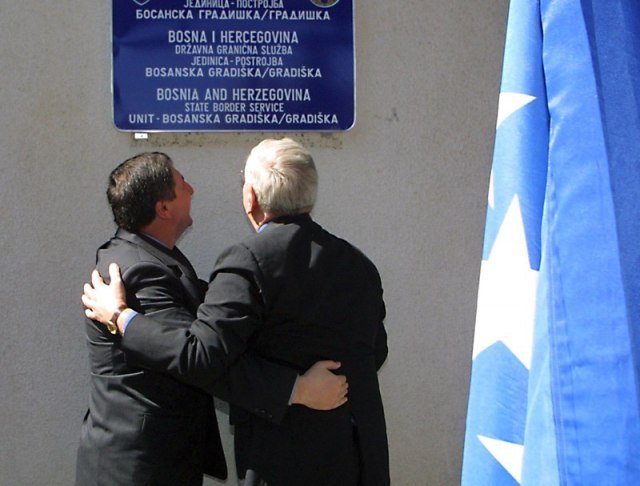"Maybe we're witnessing the end of Dayton"
Former British ambassador to Yugoslavia, Ireland and Italy, Ivor Roberts, claims that the Dayton Peace Agreement may be coming to an end.
Monday, 22.11.2021.
11:49

"Maybe we're witnessing the end of Dayton"
Former British ambassador to Yugoslavia, Ireland and Italy, Ivor Roberts, pointed out that the agreement should have served as a glue that would connect the warring debris into a common state, but that now we are reminded every now and then that the glue does not actually stick. He also states that the current political crisis in both Bosnia-Herzegovina and the EU needs to be resolved by its causes, not symptoms.He also points out that Bosnia-Herzegovina is once again in a political crisis: negotiations on EU membership are stalled, while Milorad Dodik is threatening to withdraw from state institutions, including the joint army, and de facto secede from the state.
"But this time, we could look to the end of the Dayton Accords while ignoring the root cause," Roberts said, recalling that High Representative for BiH Christian Schmidt concluded in a recent report to the UN Security Council that Bosnia-Herzegovina was facing the greatest existential threat in the post-war period", as well as the fact that he called for the extension of the mandate of the small EU military forces, which he was granted.
"However, it is important not to overlook the fact that Dodik's threats come as a direct response to the decision by which former High Representative Valentin Inzko now imposed a law punishing denial of the Srebrenica genocide with up to five years in prison," the Brussels portal Politiko said, which was transmitted by Sarajevo's Oslobodjenje. After the decision was made, Inzko said two interesting things, first of all that he knew how Dodik would react, and secondly that his decision to impose a law on genocide denial harmonized Bosnia-Herzegovina with European norms.
"As for the first paragraph, Inzko says that in his opinion, provoking the biggest conflict in BiH after the war in order to pass this law is worth it, which I, as someone who witnessed the brutal war in BiH and as a participant in the talks that led to the Dayton, cannot agree with. When it comes to the second position, harmonization with EU norms makes sense if the country will inevitably become a member of the EU, except that it will not," Roberts said.
"For Bosnia-Herzegovina, the prospect of EU membership promised to ease ethnic tensions that have continued since the signing of the Dayton Accords. In that sense, Dayton has been a huge success - preserving peace, an achievement many thought impossible. In addition, the country has succeeded to reaffirm BiH's identity, which most are proud of", he said. However, Roberts states that realists have always known that Dayton was a good way to end the war, but a bad way to build a state.
"There are many reasons why this failed, but the important thing is that Dayton, unlike earlier peace agreements that proposed a multiethnic cantonal structure, actually ensured the division of Bosnia and Herzegovina into two ethnic blocs with a high degree of autonomy in a decentralized common state", he adds.
Roberts recalls how former high representatives, especially the late Paddy Ashdown, tried for years to revise Dayton in order to build a stronger center, but Serbs from Bosnia-Herzegovina resisted, stating that it was not something they signed.
"So, there has been and still is a lasting conflict between the high representative's centralization aspirations and the Bosnian Serbs' insistence on decentralization," the text concludes, but adds that the EU cannot "impose European norms through an unelected governor, if those European norms are nowhere to be found".
"On the other hand, US President Joe Biden sees Bosnia-Herzegovina and Kosovo as unfinished business and has already signaled that the US is ready to get involved in resolving these protracted crises. He has an extremely experienced team of Balkan experts at the State Department and has already sent one, a smart and helpful Escobar, to put out the fire in Bosnia, cleverly taking the lead from the weak hands of Europeans", Roberts said, concluding that it was unusual for the United States to be chosen to alleviate the crisis within Europe itself.



























































Komentari 4
Pogledaj komentare